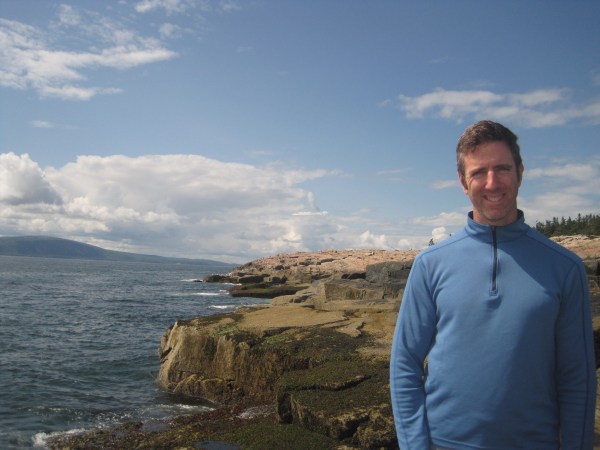Be the Example You Want to See
March 15, 2015
By: Iris Picat
Wanting to break out of his Navy mold, Darin Liston pondered his next move. “I thought natural resources was a better fit for me in the long run; helping to save the planet,” rather than being a government contractor. When he saw the Executive Masters of Natural Resources (XMNR) program available in his own backyard in the National Capital Region, he was sold.
Joining the Navy in 1991, Darin has held an array of positions within its precincts – from Naval Officer and Aviator, to Electronic Warfare Officer in the 25th Infantry Division in Iraq, to International Engagement Officer for Latin America and South Asia in the Navy’s Office of Plans, Policy and Strategy at the Pentagon. In Iraq, Darin led a 120-person team to provide logistics, maintenance, training, planning and operations for the Army’s ground electronic warfare capability; the mission was to install, maintain, and operate more than 3,000 pieces of equipment, which helped reduce the casualty rate related to radio-controlled IEDs by 68 percent. As the International Engagement Officer, he continued to excel, leading a team to create the first-ever international engagement prioritization methodology for senior leadership using quantitative analysis.

Throughout this trajectory, one thing is clear: Darin is an outstanding leader and strategic thinker.
Next on his resume was his position as Political / Military Advisor for the U.S. Department of State’s Bureau of Arms Control, Verification and Compliance (AVC). His knowledge of sustainability issues had been limited to what he had read out of personal interest on energy efficiency for homes and cars. So he volunteered for a collateral duty as the Bureau’s representative to the Greening Diplomacy Initiative, which is predominantly focused on internal Department operations, to gain exposure in the field.
“I was only the AVC representative for a short time, but it was interesting to see [the Department of] State trying to be green. I think their next step should be incorporating sustainability into the actual diplomacy.”
What this position does lend itself to is international negotiations, and Darin, among representatives from other bureaus, was a catalyst for the first U.S.–Russian agreement on Antarctica. After a cordial agreement with the Russian Antarctic program, the cross-disciplinary and cross-boundary team managed to reduce inspection costs by 40 percent by proposing to share resources and alternate the travel costs between countries each year.
Not only has Darin proved himself to be an exemplary employee and team player, he has also had his share of academia. After a year in engineering at the University of Michigan, he went on to graduate from the U.S. Naval Academy with distinction and a B.S. in oceanography. He continued on to get a Masters in national security and strategic studies, with a focus in international relations, from the U.S. Naval War College.
Despite all this international experience, both theoretical and in practice, Darin says he was “wholly ignorant of the social aspect of sustainability” when he started the XMNR program in January 2012. He credits his military background for honing his leadership skills, which come in handy in XMNR projects, but he also chose to practice being a team member instead of always being in charge.
“I think anybody can benefit from XMNR; it’s all a matter of knowing what you want to get out of it, and that takes some self-reflection,” Darin says. A huge advantage of the XMNR program is that it lends itself well to self-exploration, while also gaining insight and making valuable connections with others. “I think networking is THE way to make it in the world today – business or otherwise – it’s so often that the people who know you will help you,” he adds.

And who better to understand this than Darin who landed a job as a Senior Analyst at Marstel-Day, Environmental Consulting, LLC., thanks to a tip from one of his cohort peers, Caitlin Dufraine. He is currently the operations manager for teams performing sustainability and natural resource assessments in the US, Germany, Korea and Japan. Along with engagements with U.S. government agencies on sustainability, compatible land use and renewable energy siting, he continues to carry the networking torch, hiring three of his former Navy and State colleagues to Marstel-Day since his arrival.
Darin states that people are often indirectly helping the planet. His position may not “seem too tree-huggy, but we help the Department of Defense improve management of natural resources, and they are one of the largest landowners in the U.S.” He continues, “so don’t think that just because you are not planting trees, that you are not doing any good for the planet,” adding that much of how people influence the world is by example.
So now what? – Presently, Darin is happily employed and, already having his flight instructor certificate in helicopters under his belt, is working on his flight instructor license for airplanes. “I’m still working on what my end goal is. But who really has an end goal? When you get there, you create a new goal.”


